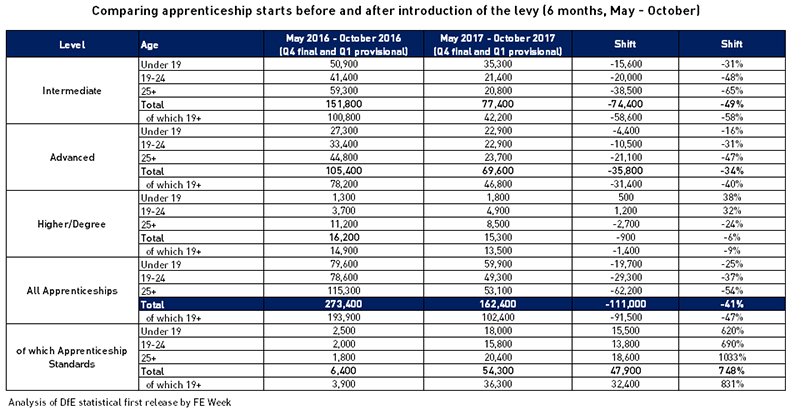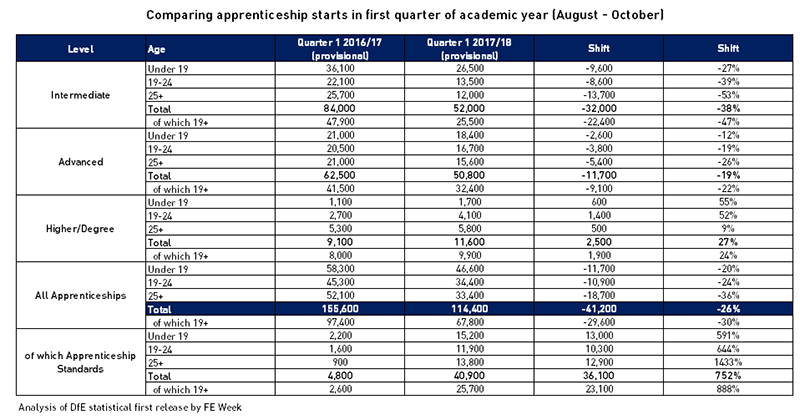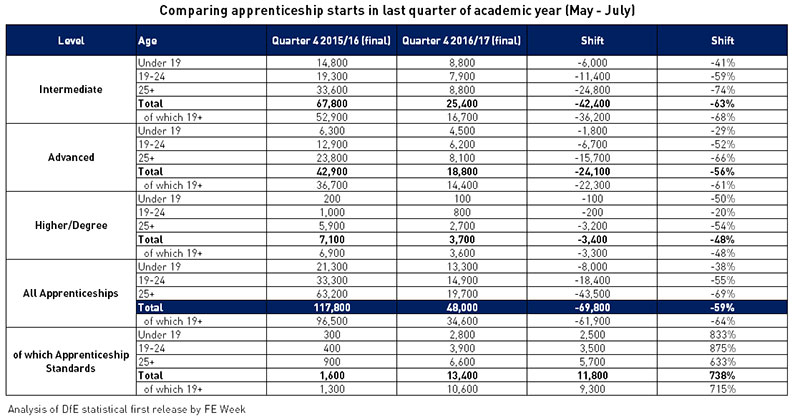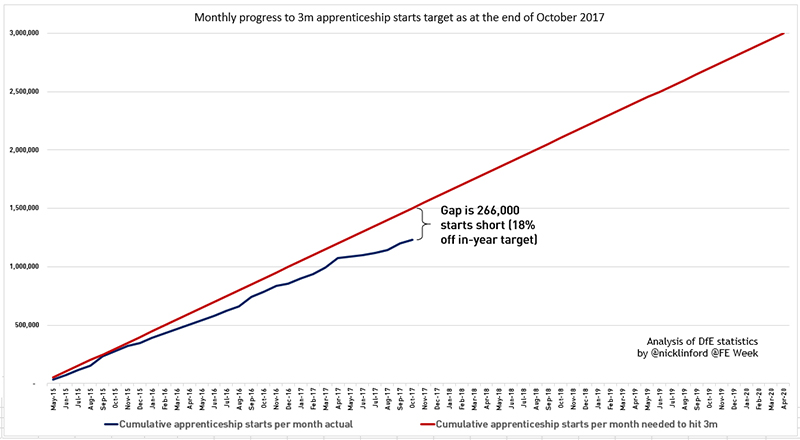Total apprenticeship starts fell 41 percent for the six months since May when the levy was introduced, compared to the same period the previous year (see below).

Provisional figures published by the DfE this morning report provisional starts for the first quarter of 2017, covering the months of August, September and October. This shows a 26 percent fall compared to the same quarter the previous year.

When these latest provisional figures are added to final starts from May to July (see below), the performance of the first six months of the reform programme shows the sluggish start continues.

Exactly half way into the five year Manifesto commitment target to achieve 3 million starts, the figures show an 18 percent (266,000 starts) shortfall.

Responding to the latest figures, Minister for Apprenticeships and Skills Anne Milton said: “The last year has been a period of significant change, it will take time for employers to adjust.
“But we must not lose sight of why we introduced our reforms in the first place – to put quality at the heart of this programme, and putting control in the hands of employers.
“It is right that they are taking their time to plan ahead, with two years to spend their levy funds, and maximise the opportunities an apprenticeship can bring for both the learner and employer. Feedback we’ve had shows employers are doing exactly that.”
The Department for Education report accompanying the data said: “There were 114,400 apprenticeship starts reported so far for the first quarter of the 2017/18 academic year, compared to 155,600 reported at this time in 2016/17, a decrease of 26.5 per cent. However, the decrease was not as large as the drop between quarter 4 2015/16 and quarter 4 2016/17 (59.3 per cent), which is likely to be associated with the introduction of the apprenticeship levy in April 2017. There have been 67,200 levy-supported starts so far, of which, 46,100 were reported in the first quarter for 2017/18.”
The latest figures have caused concern in the sector.
The Association of Employment and Learning Providers’ (AELP) chief executive, Mark Dawe, warned ministers should be “really concerned” about the “social mobility agenda” after data revealed a continued drop in starts for both young people and at lower levels and called for cuts to the sector to be reversed.
He added: “The government has got to look again at the incentives for recruiting young people and make sure that there are apprenticeship opportunities available across the country. This means that employers shouldn’t be charged for taking on 16 to 24 year old apprentices and they should be given more flexibility in how they train them.”
EEF’s head of education and skills policy, Verity Davidge, said the figures should be a “wake-up call” to the government that the “apprenticeship levy and wider reforms aren’t working”, and called for a “radical rethink”.
She said: “The fact that the drop isn’t as huge as the previous quarter is by no means a cause for celebration, as the numbers are a snapshot of the time when most apprentices begin. The only ray of hope we can find is the increase in the number of higher apprenticeships.
“Government must listen to business concerns and ensure the levy delivers the demand-led system that was promised to employers.”
The Learning and Work Institute’s chief executive, Stephen Evans, described the fall in apprenticeship starts as “worrying” and said the government risks “both missing the target and missing the point” unless there is a change in government policies including measuring completions, quality and access to courses.
He said: “A smaller fall is probably not the headline the Government were looking for, and their three million target looks some distance away.
“We need to look more broadly at the learning and skills system for young people as a whole. Our research shows a rise in the proportion of young people spending at least six months not in education, employment or training and an increasing disconnect with the official claimant count. The fall in traineeship numbers today shows a decline in routes to apprenticeships for many young people.”
Others took to Twitter to voice their worries.
Awful Apprs stats again.DfE responses resembling Mr Micawber hoping something will turn up.They need to take a serious look at Levy use now.
— Gordon Marsden MP (@GordonMarsden) January 25, 2018
Need to look at the levy now before providers pull out of the delivery process. Worse when some framework funding dropped for apprenticeships where there is no new standard
— Peter Thompson (@PthompsonSTG) January 25, 2018
Government 3m starts target is slipping away, which in itself is no bad thing. Key question – are starts down because employers are focusing on quality apprenticeships now that it’s their money, or is it because the system isn’t functioning properly? https://t.co/Gmtcumhq6M
— Andy Norman (@andynorman810) January 25, 2018
Yes, signs that things are turning around. But now great chance to abandon starts target & focus on access, quality, outcomes & building capacity & capability to deliver that
— David Hughes (@AoCDavidH) January 25, 2018
With #Apprenticeships starts falling and questions about how the policy and strategy are being delivered will @educationgovuk @ESFAgov undertake a urgent review and speak to businesses and others to find a way to unpick this before it’s too late.
— Ian Pegg (@SkillsandEduLtd) January 25, 2018








It continues to be frustrating when the Levy is headlined as the issue when the reality on the ground for many are the rule changes, introduction of Apprentice Standards that are not attractive to sector employers /learners and of course significant employer fee contributions and cost associated with 20% time off. When you thrown in the mix government agencies of various sorts that are not fit for purpose, then we are all left with a mess.
What does a mess look like? Let’s take Health and Social Care where new Apprentice Standards at Level 2 and 3 were approved last year and it was decided that the previous Frameworks will be switched off in December 2017. The new Standard had the original QCF Diploma included in it as a requirement. It was also decided that all QCF Diploma’s would end in December 2017 and would be replaced with a new RQF version of the Diploma. What has happened? The new Standards already introduced still have not been updated and approved to include the new RQF Diploma at levels 2 and 3. Therefore, from 1st January 2018 the QCF Diploma qualification in the new Standard is no longer available to use for new starts. Apprentice Learners in Adult Health and Social Care Levels 2 and 3 currently therefore do not have a valid qualification in the standard and the Frameworks are switched off! We have gone already a month without no valid Apprenticeship at Level 2 and 3 in what was previously a significant apprentice start generator for the government targets. You couldn’t make it up !
I think employers are voting with their feet. Providers are keen to be responsive and flexible and will do their best to be so (if they have a contract). Fact is that this employer-led system is tied up in rules and constraints such as 20% off-the-job, sub-contracting rules, EPA requirements and new standards that may or may not be available. Add to that that the employer’s chosen provider may now have a contract to support them and it isn’t surprising that a Government system that was working really well is creaking under the pressure of relentless widespread change. The Government needs to listen, and fast, before employer commitment and the provider base are further undermined.
No real mention of providers pulling away- its not just employers! For a Level 2 Warehousing App. as an example- what on earth could we deliver off the job for a day per week average? Employers may well release staff if there is value, but when you factor off the job learning in this sector that isn’t allowed eg Plant training, then I am up to about 8 days worth of relevant off job learning we could offer. Answer we are not delivering this qual any longer!